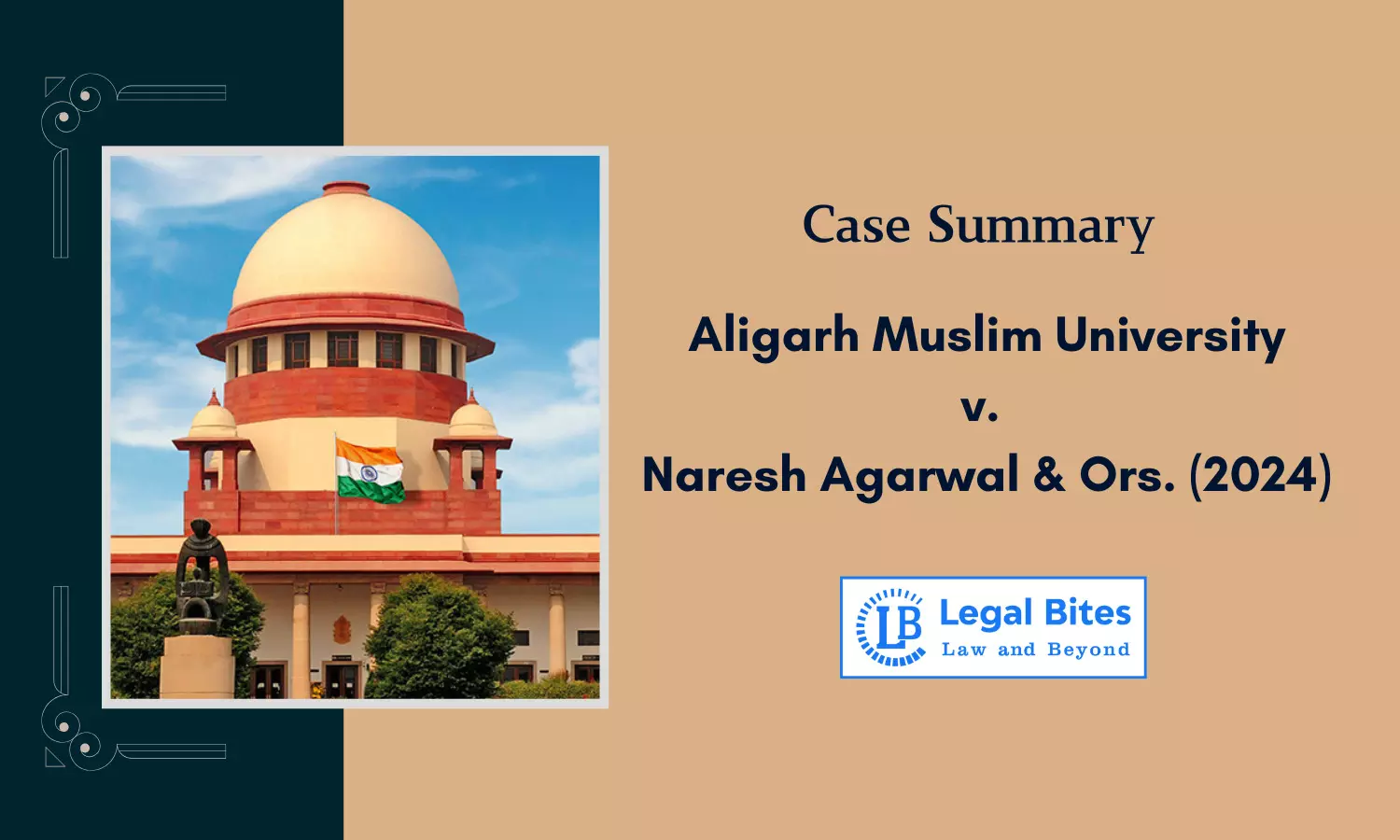Case Summary: Aligarh Muslim University v. Naresh Agarwal & Ors. (2024) | Minority Rights in India
The judgment reaffirmed the principles of equality and clarified the scope of Article 30(1), balancing minority rights with the larger public interest.

The case of Aligarh Muslim University (AMU) v. Naresh Agarwal & Ors. raises critical issues surrounding the interpretation of Article 30(1) of the Indian Constitution, which guarantees religious and linguistic minorities the right to establish and administer educational institutions of their choice. The case hinges on whether AMU qualifies as a minority institution entitled to the protections under Article 30(1).Case Title: Aligarh Muslim University v. Naresh Agarwal &...
The case of Aligarh Muslim University (AMU) v. Naresh Agarwal & Ors. raises critical issues surrounding the interpretation of Article 30(1) of the Indian Constitution, which guarantees religious and linguistic minorities the right to establish and administer educational institutions of their choice. The case hinges on whether AMU qualifies as a minority institution entitled to the protections under Article 30(1).
Case Title: Aligarh Muslim University v. Naresh Agarwal & Ors.
Citation: Civil Appeal No. 2286 of 2006
Court: Supreme Court of India
Date of Judgment: 08.11.2024
Facts
Establishment of AMU: Aligarh Muslim University (AMU) was established under the Aligarh Muslim University Act, 1920, which converted the Muhammadan Anglo-Oriental College into a university through a statutory enactment.
Azeez Basha Case (1968): The Supreme Court, in S. Azeez Basha v. Union of India, held that AMU was not established by the Muslim community but by a statutory act of Parliament, and therefore, it did not qualify as a minority institution under Article 30(1) of the Indian Constitution.
Reservation Policy: In 2002, AMU introduced a reservation policy allocating 50% of postgraduate medical seats to Muslim students. This policy was challenged because AMU was not a minority institution.
The AMU (Amendment) Act, 1981: The AMU (Amendment) Act, 1981, sought to recognize AMU as a minority institution. However, its validity was contested, as it did not alter the statutory foundation of AMU established in the Azeez Basha judgment.
Issues:
- Minority Institution Status: Does AMU qualify as a minority institution under Article 30(1), given its statutory establishment by Parliament in 1920?
- Implications of Azeez Basha Judgment: Whether the findings in the Azeez Basha case, which held AMU was not established by the Muslim minority, remain binding.
- Validity of the 1981 Amendment: Can statutory amendments retroactively confer minority status on an institution established by Parliament?
- Reservation Policy: Is AMU’s 50% reservation for Muslim students in postgraduate medical courses constitutional, given its status as a non-minority institution?
- Conjunctive Interpretation of "Establish and Administer": Does the interpretation of Article 30(1) require that minority institutions must both be established and administered by the minority?
Judgment:
The Supreme Court upheld the principles established in the Azeez Basha case, reaffirming that:
Minority Institution Status: AMU does not qualify as a minority institution because it was established by a statutory enactment of Parliament in 1920, not by the Muslim community. The conjunctive requirement of "establish and administer" under Article 30(1) was not fulfilled.
Validity of 1981 Amendment: The amendments to the AMU Act in 1981, which sought to recognize AMU as a minority institution, could not override the historical and legal findings of the Azeez Basha judgment. Statutory amendments cannot retroactively change the foundational facts of an institution’s establishment.
Reservation Policy: Since AMU was not a minority institution, its policy of reserving 50% of seats for Muslim students violated constitutional principles of equality under Articles 14 and 15.
Governance and Administration: The administrative structure of AMU, involving non-Muslim oversight and statutory control, further disqualified it from being classified as a minority-administered institution.
The Court’s decision reasserted the importance of interpreting "establish and administer" conjunctively under Article 30(1), ensuring consistency in constitutional jurisprudence.
Conclusion
The Supreme Court’s decision in Aligarh Muslim University v. Naresh Agarwal & Ors. reaffirms the principles established in Azeez Basha while addressing subsequent developments. By upholding constitutional validity and rejecting unwarranted claims of minority status, the judgment strikes a balance between individual rights and the broader public interest. The ruling underscores the importance of statutory clarity, historical context, and judicial consistency in interpreting constitutional provisions related to minority rights.
Click Here to Read the Official Judgment

Karan Patel
Karan Patel is an alumnus of the prestigious Faculty of Law, Delhi University, with a specialization in Civil Law and Procedural Law. As a dedicated legal scholar, his work focuses on exploring the nuances of civil justice systems and procedural frameworks through in-depth research and writing.
